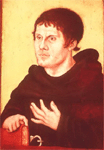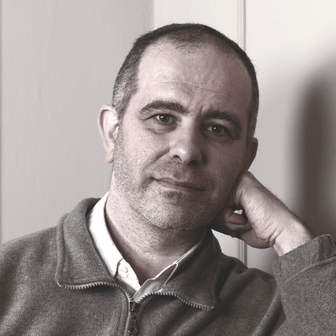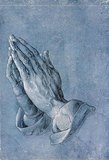Martin Luther

Martin Luther was a German religious reformer (1483
- 1546) and the initiator of the Protestant Reform. He entered the
Augustinian convent of Erfurt in 1505 and was ordained priest in
1507. He studied philosophy at Erfurt University and received his
Doctor of theology Degree in 1512, becoming professor of biblical
exegetics.
In 1515 and 1516 he wrote his comments on the Letters of St. Paul
that preannounced his theological position: man is always sinner
and can act only as penitent towards God while awaiting his
mysterious divine grace. In 1517 special indulgences were banned in
Germany, applicable to the souls in purgatory and that involved
pecuniary offerings: the money raised was to be used by Leo X for
the construction of the Basilica of St. Peter's in Rome. The
collection of funds was the cause of scandals and abuses. Luther
rebelled against these abuses on October 31st 1517, and had 95
Theses posted on the door of Wittemberg Cathedral in Latin, in
which he criticised the ecclesiastic practice of indulgences,
votes, pilgrimages, fasting, and wealth of the Church of Rome, and
defended a public discussion between theologians on the efficacy of
the indulgences. The controversy flared up violently. Declared an
heretic by the pope (1518), Luther refused to withdraw from his
positions; in the dispute of Lipsia (1519) he denied the supremacy
of the pope, the infallibility of Church General Councils, and
declared that the Sacred Scriptures were the only rule of
faith.
The papal bull Exsurge Domine (Arise O Lord) (1520) of Leo X
was to be a warning to the rebellious monk. Either he retracted his
errors within 60 days, or he would face excommunication. Luther
responded by publicly burning the papal bull, sustaining that all
Christians, according to St. Peter's expression "a royal priesthood
and a priestly kingdom" (doctrine of universal priesthood), and
that same year laid down the foundations of a church reform in
three treatises: To the Christian nobility of the German
nation, De captivitate babylonica ecclesiae, De
libertate christiana. On January 3rd 1521 the bull Decet
Romanum Pontificem Leo X irrevocably excommunicated
Luther.
Luther was banned by the Diet of Worms Empire (May 26th 1521), and
in order to protect him the prince-elector of Saxony Frederick the
Wise had him seized and taken to Eisenach, sheltering him at
Wartburg Castle, where Luther began his German translation of the
bible (New Testament), which was completed by the end of 1534, and
formed his literary and religious masterpiece.
In 1525 Luther joined in marriage with the former nun Katharina Von
Bora who bore him 6 children; it was also the year that marked the
publication of De servo arbitrio, which fell within the
controversy with Erasmus on the liberty of human will and documents
the fracture of the humanistic spirit. During the same year he
severely fought against the rebellion of the farmers lead by Th.
Muntzer. Apart from the reorganisation of the liturgy, he was
awaiting also the composition of hymns for the cult and the
Small and Large Catechism (1529): the conversations held
with friends and disciples are gathered in Table
Talks.

Ciao,
mi chiamo Stefano.
Piemonte Sacro è la mia passione dal 2001.
AIUTA il progetto Piemonte Sacro a crescere
DONA SOLO 2 euro! Te ne sarò GRATO .




